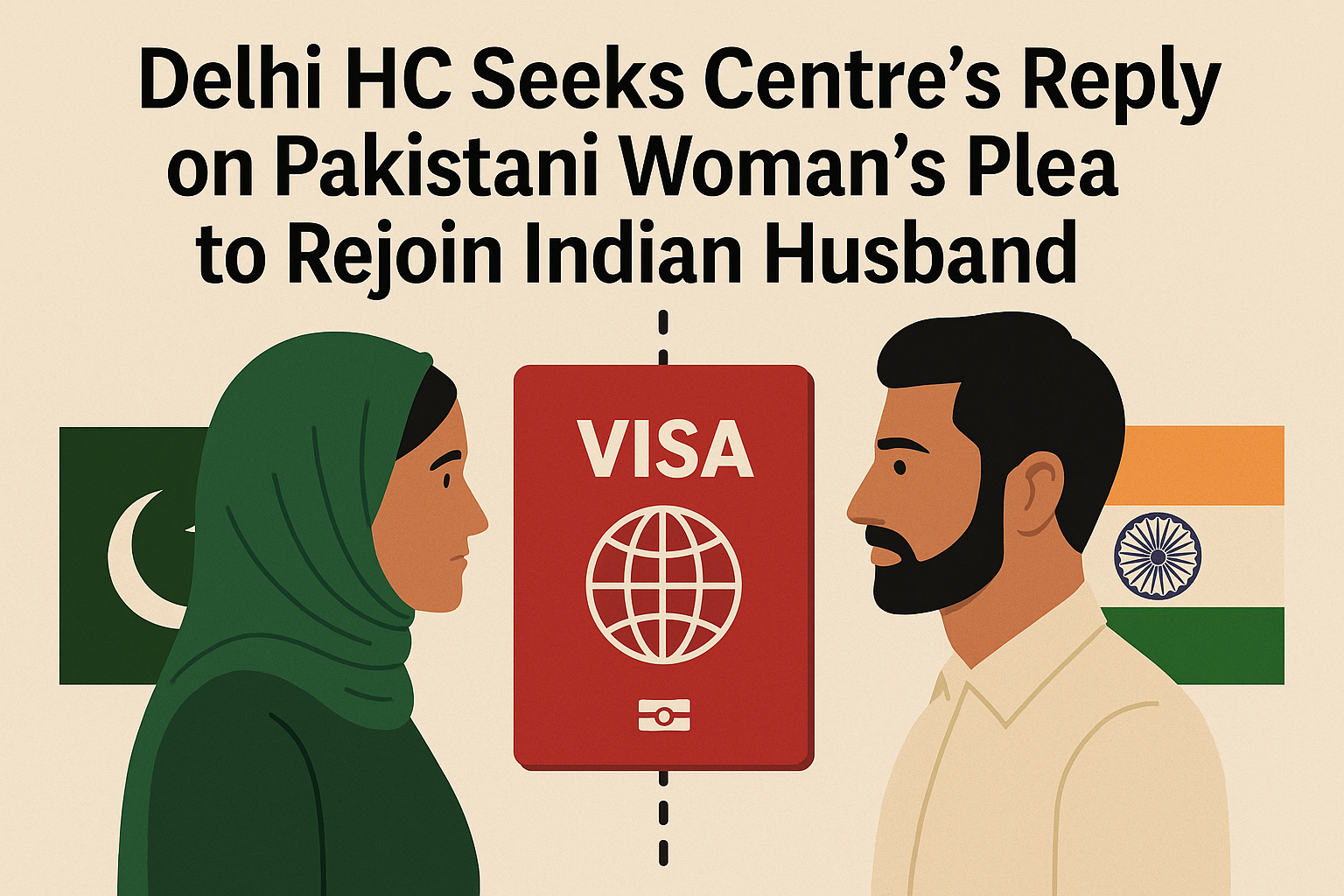The Delhi High Court has sought the Centre’s response on a petition filed by a Pakistani woman, Ruqaiya Obaeed, whose visa to stay in India was revoked following the April 2025 Pahalgam terror attack. The case highlights the human cost of cross-border travel restrictions and has reignited discussions on visa policy for Indo-Pak marriages.
The Case Before the Delhi High Court
The matter was heard by Justice Sachin Datta, who issued a notice to the Union government on October 7, 2025, asking it to clarify its position by November 12, 2025. The court’s intervention came after Obaeed filed a writ petition challenging the cancellation of her visa and seeking permission to return to India to live with her husband.
Obaeed’s legal counsel — senior advocate Sanjeev Sagar and advocate Nazia Parveen — argued that her deportation and visa cancellation violated her right to conjugal companionship and that she had been living lawfully in India prior to the policy shift.
What Triggered the Visa Cancellation
Obaeed’s visa was revoked on April 25, 2025, just three days after the terror attack in Pahalgam (Jammu & Kashmir) on April 22, which left several security personnel injured and heightened tensions between India and Pakistan.
Following the attack, India suspended visa services for Pakistani nationals, citing national security concerns. This led to the cancellation of all active visas issued to Pakistani citizens during that period.
Obaeed, who had entered India on April 5, 2025, through the Attari–Wagah border on a valid visitor visa, was subsequently asked to leave the country despite being married to an Indian citizen.
The Petitioner’s Argument
In her plea, Obaeed states that she has been married to Indian national Ubada Abul Barakat Farooqi, a resident of Delhi, for several years. The families, according to her petition, have shared cordial relations and have visited each other’s homes across the border multiple times before the visa ban.
Her counsel argued that the visa cancellation was arbitrary, made without individual assessment, and caused undue emotional distress by separating a legally married couple. The plea requests the government to reinstate her visa or issue a fresh long-term entry permit, allowing her to reunite with her husband in India.
Centre’s Position and Next Steps
The Central Government has been asked by the court to submit its reply before the next hearing scheduled for November 12, 2025. Officials maintain that visa services were halted in April as part of broader security measures following what they described as a “diabolical and inhumane terror attack.”
While no formal response has been filed yet, legal experts note that this case could set an important precedent for Indo-Pak cross-border marriage cases affected by blanket visa restrictions.
Why the Case Matters
The petition underscores the complex balance between national security and individual rights. Cross-border marriages between Indian and Pakistani citizens are not uncommon, particularly in Delhi, Rajasthan, and Punjab. However, policy decisions made in response to security events often leave families separated and without clear legal recourse.
If the High Court rules in favor of Obaeed, it may open the door for case-by-case humanitarian visa assessments rather than across-the-board cancellations. On the other hand, if the government’s security rationale is upheld, the case could reinforce the need for a formal bilateral humanitarian visa framework between India and Pakistan.
Broader Legal and Humanitarian Context
This case is not the first of its kind. In previous instances, Indian courts have intervened to allow Pakistani spouses to stay temporarily or reapply for entry visas under humanitarian grounds.
Legal scholars argue that such petitions highlight the need for policy-level clarity on visa renewal and residence rights for foreign nationals married to Indian citizens.
As India continues to tighten border and security protocols, cases like Obaeed’s expose the human consequences of geopolitical policies — especially for couples bound by legal marriage but divided by national borders.
FAQs on the Delhi High Court Case Involving the Pakistani Woman’s Visa
Who is the Pakistani woman who approached the Delhi High Court?
The petitioner is Ruqaiya Obaeed, a Pakistani national married to an Indian citizen, Ubada Abul Barakat Farooqi, who lives in Delhi.
Why was her Indian visa cancelled?
Her visa was revoked in April 2025 after the Pahalgam terror attack in Jammu and Kashmir on April 22, 2025, when India suspended visa services for Pakistani citizens due to heightened security concerns.
When did Ruqaiya Obaeed enter India?
She entered India on April 5, 2025, through the Attari–Wagah border on a valid visitor visa, intending to stay with her husband in Delhi.
What is she requesting from the Delhi High Court?
She has asked the court to direct the Central Government to reinstate her visa or issue a fresh long-term entry permit so she can reunite with her husband and continue her marital life in India.
Which judge is hearing the case?
The case is being heard by Justice Sachin Datta of the Delhi High Court.
What has the Delhi High Court said so far?
The court has issued a notice to the Centre, seeking its response by November 12, 2025, on why her visa was cancelled and whether she can be allowed to return on humanitarian grounds.
Who is representing Ruqaiya Obaeed in court?
She is represented by senior advocate Sanjeev Sagar and advocate Nazia Parveen, who argue that her deportation violated her right to conjugal companionship as a lawfully married woman.
What is the Centre’s position on the matter?
The government has not filed a formal reply yet, but officials have maintained that the visa cancellations were part of a national security measure following the Pahalgam terror incident.
Why is this case significant?
The case highlights the tension between national security and humanitarian rights. Its outcome may set a precedent for how India handles visa cases involving cross-border marriages after blanket suspensions.
When is the next hearing scheduled?
The next hearing is scheduled for November 12, 2025, when the Centre is expected to file its response before the Delhi High Court.

